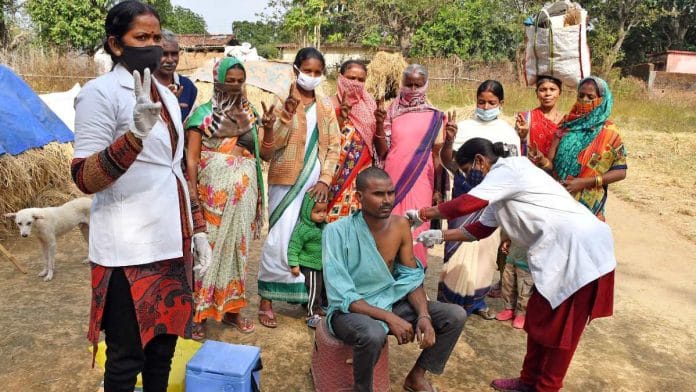New Delhi: India’s strategy of prioritising the unvaccinated before it starts on booster doses is sound but additional doses for immunocompromised people may be in order, feels Dr Brian Wahl, infectious disease epidemiologist at the Johns Hopkins Bloomberg School of Public Health.
He added that “at some point”, India would also have to start vaccinating children.
Currently, about 85 per cent of adult Indians have received at least one dose of the vaccine and 50 per cent adults are fully vaccinated. The country awaits a decision both on booster doses and on vaccination of children.
“The purpose of vaccinations is to reduce the likelihood of serious diseases and death. What I would prioritise, and that is what India has done, is to immunise the 15 per cent that is left and also prioritise the second dose for those that have got only one,” said Wahl.
“Once sufficient progress has been made in getting those immunised, immunocompromised individuals who did not mount a strong response to the vaccine should be prioritised for an additional dose,” he added.
Wahl is part of the ‘Teeka Lagwaya Na?’ campaign which Johns Hopkins is currently engaged in alongside PGIMER Chandigarh and others to encourage people to get vaccinated.
Also read: Covid-19 vaccination now compulsory in Puducherry, those skipping to face penal action
Low risk is not no risk
Children, said Wahl, are at low risk of severe disease, but low risk is not the same as no risk. An additional consideration is to vaccinate children to reduce transmission to adults around them, so that immunocompromised individuals and those with comorbidities should continue to be top priority.
“…But given there is a licensed vaccine and given there are doses available it may be a good idea to start vaccinating children at some point. For me it boils down to absolute and relative risk. Children are low risk but if we can reduce it even further at some point then that would be a sound public health policy to pursue,” he said.
The government of India has placed an order for one crore doses of ZyCov-D, the world’s first DNA vaccine manufactured by Zydus Cadila. The vaccine is licensed for use in children aged between 12 and 17 years.
As on Tuesday morning, there were 20.13 crore vaccine doses lying unused with states.
‘Covid seems to be endemic in India’
The question of endemicity is not terribly important, Wahl asserts, but adds that going by the technical definition of the term, Covid does seem to be endemic in India. According to him, the question really is the levels at which endemicity has settled — high or low?
“The technical definition of endemic is that a disease is circulating in a community without causing spikes in cases. It is a relative term. Even if it is circulating without causing epidemic spikes, there could still be epidemic potential. ‘Endemic’ is not a fixed classification, it can change over time. Yes, Covid seems to be endemic, but that doesn’t mean we cannot be in an epidemic phase over time,” he said.
Describing India as one of the most vaccine-confident nations, Wahl said vaccine mandates — a requirement for compulsory vaccination — like the one decreed by the Puducherry government or the Kerala government’s refusal to treat the unvaccinated for free may be something whose time has arrived.
“Ideally, we would not want to force people to do anything but given where we are in the pandemic, speaking from a global perspective, I am more and more of the mind about targeted mandates for certain professions…(work). About broad population level mandates I am not fully there yet, but mandates may be the way forward to expand vaccinations to those that are still on the fence,” Wahl said.
‘Third wave on par with second wave unlikely’
The world, said Wahl, has never seen mutations like those the Omicron variant of the SARS-CoV2 virus has on its spike protein, and in those numbers.
There is still much to learn about how much they make the virus evade the immune system, or how infectious those make them, said Wahl.
However, the key question remains its capacity to cause serious disease in both the vaccinated and the unvaccinated, said Wahl. While it is not possible yet to make comparative estimates of infectivity, added Wahl, it was the overwhelmed health system that caused the devastation that India and many other countries saw during the second wave.
“One of the reasons why the Delta (variant) both in India and other countries was so devastating was the steep rise in cases (that) overwhelmed health systems and that was a large part of what drove the second wave in India. We are not currently where we were at the beginning of 2021. I think it is unlikely we will see a third wave at par with the second wave. We know a lot more, also we have a lot more immunity now — both infection and vaccine induced,” he said.
(Edited by Saikat Niyogi)
Also read: Why Covid cases in India are decreasing, despite low double vaccination rate






